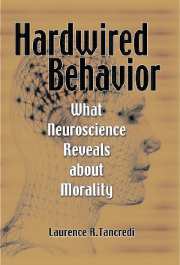Crossref Citations
This Book has been
cited by the following publications. This list is generated based on data provided by Crossref.
Ramazani, Vaheed
2007.
Writing in Pain.
p.
1.
Pereira, Luís Moniz
and
Saptawijaya, Ari
2007.
Progress in Artificial Intelligence.
Vol. 4874,
Issue. ,
p.
99.
Beaver, Kevin M.
Wright, John Paul
and
Delisi, Matt
2007.
Self-Control as an Executive Function.
Criminal Justice and Behavior,
Vol. 34,
Issue. 10,
p.
1345.
Nadelhoffer, Thomas
Brown, Richard
Brown, Derek H.
and
Munn, Penny
2007.
Reviews.
Philosophical Psychology,
Vol. 20,
Issue. 3,
p.
393.
Hunter, John
2008.
Introduction to Special Issue: The Plus Ultra of Empirical Research.
Review of General Psychology,
Vol. 12,
Issue. 2,
p.
100.
Buller, Tom
2008.
Morality in a Blur.
The American Journal of Bioethics,
Vol. 8,
Issue. 5,
p.
21.
Dent, Chris
2009.
Not all practices are equal: an exploration of discourses, governmentality and scale-free networks.
Social Semiotics,
Vol. 19,
Issue. 3,
p.
345.
Kaposy, Chris
2009.
Will Neuroscientific Discoveries about Free Will and Selfhood Change our Ethical Practices?.
Neuroethics,
Vol. 2,
Issue. 1,
p.
51.
Leeman, Robert F.
Grant, Jon E.
and
Potenza, Marc N.
2009.
Behavioral and neurological foundations for the moral and legal implications of intoxication, addictive behaviors and disinhibition.
Behavioral Sciences & the Law,
Vol. 27,
Issue. 2,
p.
237.
2009.
Governing Lethal Behavior in Autonomous Robots.
p.
247.
Vatn, Arild
2009.
Institutions and Sustainability.
p.
293.
Herr, Ranjoo Seodu
2010.
Agency without autonomy: valuational agency.
Journal of Global Ethics,
Vol. 6,
Issue. 3,
p.
239.
Lakomski, Gabriele
and
Evers, Colin W.
2010.
Passionate rationalism: the role of emotion in decision making.
Journal of Educational Administration,
Vol. 48,
Issue. 4,
p.
438.
Frerichs, Sabine
and
Münch, Richard
2010.
Handbook of the Sociology of Morality.
p.
529.
Abend, Gabriel
2011.
Thick Concepts and the Moral Brain.
European Journal of Sociology,
Vol. 52,
Issue. 1,
p.
143.
Fröding, Barbro Elisabeth Esmeralda
2011.
Cognitive Enhancement, Virtue Ethics and the Good Life.
Neuroethics,
Vol. 4,
Issue. 3,
p.
223.
Pereira, Luís Moniz
and
Saptawijaya, Ari
2011.
Machine Ethics.
p.
398.
Klemm, W. R.
2011.
Atoms of Mind.
p.
223.
Kaufman, Whitley R. P.
2012.
Can Science Determine Moral Values? A Reply to Sam Harris.
Neuroethics,
Vol. 5,
Issue. 1,
p.
55.
Vatn, Arild
2012.
Sustainability Analysis.
p.
103.





